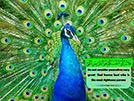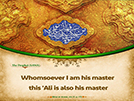Verse120-121
- Details
- Hits: 3005
(120) وَلَن تَرْضَى عَنكَ الْيَهُودُ وَلاَ النَّصَارَى حَتَّى تَتَّبِعَ مِلَّتَهُمْ قُلْ إِنَّ هُدَى اللّهِ هُوَ الْهُدَى وَلَئِنِ اتَّبَعْتَ أَهْوَاءهُم بَعْدَ الَّذِي جَاءكَ مِنَ الْعِلْمِ مَا لَكَ مِنَ اللّهِ مِن وَلِيٍّ وَلاَ نَصِيرٍ
(121) الَّذِينَ آتَيْنَاهُمُ الْكِتَابَ يَتْلُونَهُ حَقَّ تِلاَوَتِهِ أُوْلَئِكَ يُؤْمِنُونَ بِهِ وَمن يَكْفُرْ بِهِ فَأُوْلَئِكَ هُمُ الْخَاسِرُونَ
120. " For, never will the Jews be pleased with you nor the Christians unless you follow their religion. Say: ' Behold Allah's guidance is the only (true) guidance.'
And verily if you follow their desires after the knowledge has come to you, you shall have from Allah neither protector nor helper."
121. " Those to whom We have given the Book read it as it ought to be read, they are the ones that truly believe in it, and whoever disbelieves in it, they shall (surely) be the losers."
Occasion of Revelation :
On the occasion of revelation of the first of the above verses, it is narrated from Ibn Abbas that the Jews in Medina and the Christians from Najran expected that the Prophet of Islam (p.b.u.h.) would traditionally accept the same Qiblah as they had. When Allah altered the Qiblah from Jerusalem to the Ka'bah, they became disheartened with the Prophet of Islam (p.b.u.h.). (Perhaps, some of the Muslim believers, too, criticized that they should not do anything that would offend the Jews and the Christians).
The above verse was revealed and informed the Prophet (p.b.u.h.) that that group of Jews and Christians would be satisfied with him neither by coming into agreement upon the Qiblah nor by anything else except that he would follow their creeds. (1)
Some others have narrated that the Prophet (p.b.u.h.) insisted very much on convincing them to accept Islam. The above verse was revealed telling him (p.b.u.h.) to disregard that idea because never would they be pleased with him unless he followed their religion. (2)
There are also various narrations upon the occasion of revelation of the second of the above verses.
Some of the commentators believe that this verse was revealed about those people who came with Ja'far-ibn-AbiTalib from Abyssina to Medina. They had joined Islam and accompanied him when he left there. They were 40 men, thirty-two of whom were from Abyssina and eight men were from the monks of Syria among whom there was a famous Christian monk by the name of Bahira. (3)
Some other commentators believe that the verse was revealed about some people from among the Jews such as Abdillah-ibn-Salam, Shu'bat-ibn-'Amru, Tamam-ibn-Yahuda, and so on who accepted the invitation of Prophet Muhammad (p.b.u.h.) and became true believers. (4)
* * * *
Commentary :
Two Unsatisfiable Groups !
The previous verse relieves Hadrat Muhammad (p.b.u.h.) of any responsibility concerning those stubborn misguided people. Now, this verse, elaborating on the same idea, informs the Prophet (p.b.u.h.) of the reason why it is so:
" For, never will the Jews be pleased with you nor the Christians unless you follow their religion. ..."
"... Say: ' Behold Allah's guidance is the only (true) guidance'. ..."
Allah's guidance is a guidance which is not adulterated with superstitions and wrong thoughts of ignorant people. Yes, such pure noble guidance should be followed. Then, it adds:
"... And verily if you follow their desires after the knowledge has come to you, you shall have from Allah neither protector nor helper."
* * * *
But, since some of the Jewish and Christian truth-seekers accepted the invitation of the Prophet of Islam (p.b.u.h.) and embraced Islam, the Holy Qur'an, after scorning the aforementioned group, commemorates this group well by saying:
" Those to whom We have given the Book read it as it ought to be read, they are the ones that truly believe in it, ..."
"... and whoever disbelieves in it, they shall (surely) be the losers."
These people were those who truly read their Divine Book as it ought to be read and followed it accordingly. This manner of striving resulted in their being guided. Therein, they had studied the glad tidings of the advent of the promised prophet and they found those attributes congruous with Muhammad, the Prophet of Islam (p.b.u.h.), so thereby they submitted, and Allah, therefore, appreciated them.
* * * *
Explanation :
The phrase / wa la 'initaba'ta 'ahwa'ahum /, ' and verily if you follow their desires ', may prompt the readers of the verse to ask this question: Was it possible that Muhammad (p.b.u.h.) would, with his inerrant position of prophethood, follow the desires of those misguided Jews?
In answer to this question we say that these statements, which are frequently cited in the verses of the Qur'an, do not contradict with the state of inerrancy of prophets (p.b.u.th.), because on one hand, it is a conditional sentence, therefore the mentioning of the protasis does not mean that the action will definitely be performed.
On the other hand, the state of being immune from sin does not refute the capability of committing sin and err by prophets (p.b.u.th.). Although prophets and Imams (p.b.u.th.) are able to commit sin and their free will is not taken away from them, they would never contaminate themselves with corruption or even taint their souls with a single sin. In other words, they can commit sins but their belief, knowledge, and virtue is so intense that they never dras near to any sin.
Therefore, such admonishments as the above are completely appropriate for them.
Therdly, this statement, although addressing the holy prophet (p.b.u.h.), may envelop all believers entirely.
* * * *
Pleasing Enemies has its Limits
It is true that one should attract the enemis' attention towrds his invitation with the magnetic power of excellent ethice and superior charcter, but there are some who never accept the truth, they are not worth worrying about. They will never believe in the true path, hence, endeavouring to attract their attention is a waste of time.
* * * *
Allah's Guidace is the Only True Guidance
Tis fact is also understood from the above verses that the only law which can lead man towards salvation and happiness is the law and guidace of Allah, because to whatever extent the knowledge of man progresses, it is still interwoven with ignorance, doubt anddeficiency from the pointsof view of variouse aspects. Hence, the guidance which comes forth uder the shade of such incomplete knowledge connot be considered an absolute guidance. The only One who can provide ' Absolute Guidance' is the One Who possesses' Absolute Knowledge' without anygnorance or imperfection. This Attribute applies only to Allah.
How should the Book be Read?
This meaning is an expressive one which defines a clear path for us regarding the Holy Qur'an, the divine Book. Now, those who read the verses of the Qur'an are defined in several groups:
One of these groups emphasize of the forms of pronunciation and artifculation of the phonemes and morphemes and also the overall intonation of the verses of the Qur'an with their own proper Arabic points of articulation. They always think of linguistical regulations for the Arabic pronunciation of the signs and soundes, pauses and extensions, and finally, for observing the special letters in the Qur'an known as / yarmalun /.They usually are not particularly concerned with the meaning and the content of the verses they read. When they disregard the meaning of the Qur'an, their actions accordingly are obvious. The example of this kind of people is depicted in the Qur'an saying: "...is as the likeness of the ass bearing books...", (Sura Al-Jumu'ah, No. 62, verse 5).
The second group are those who, in addition to the verbal utterances, pay close attention to the meanings of the verses and contemplate over the elegancies and exquisite points of the Qur'an. They try to understand the sciences described therein, but they do not actually comply with its ordinances.
The third group are those true believers who accept the Qur'an as a mandate of action and use it as a comprehensive program for their lives. They consider the recitation of this great Book, contemplation over its meanings, and conception of its purposes as preliminary for their actions. That is why whenever they recite the Qur'an, a fresh and pleasing state encompasses their souls allowing them to make new decisions with vigorous intention and a strong inner feeling of preparedness for their actions. This is, perhaps, the privilege granted for reading the Book in the way in which it ought to be read.
A tradition from Imam Sadiq (a.s.), commenting on this verse, says: " They recite its verses slowly, and understand it, and act according to its orders, and hope for its promises, and are afraid of its threats, and take lessons from its stories, and obey its commandments, and desist from what it prohibits. By God, it does not mean memorizing its verses, and studying its letters, and reciting its chapters, and learning its one-tenths and one-fifths. They remembered its words and neglected its boundaries. And what it means is meditating on its verses and acting according to its orders. Allah, the High, has said: ' (It is) a Book We have sent down to you abounding in good,so that they may ponder over its verses'...", (38: 29), (Irshadul-Qulub, ad-Daylami). (5)
(1) Abul-Futuh Razi, Commentary, vol. 1, p. 308
(2) Majma'-ul-Bayan, vol. , p. 197
(3) Majma'-ul-Bayan, vol. 1, p. 198
(4) Ibid, & Tafsir Abul-Futuh Razi, vol.1 , p.310
(5) Al-Mizan, commentary, vol.2, p.70 (English version)











